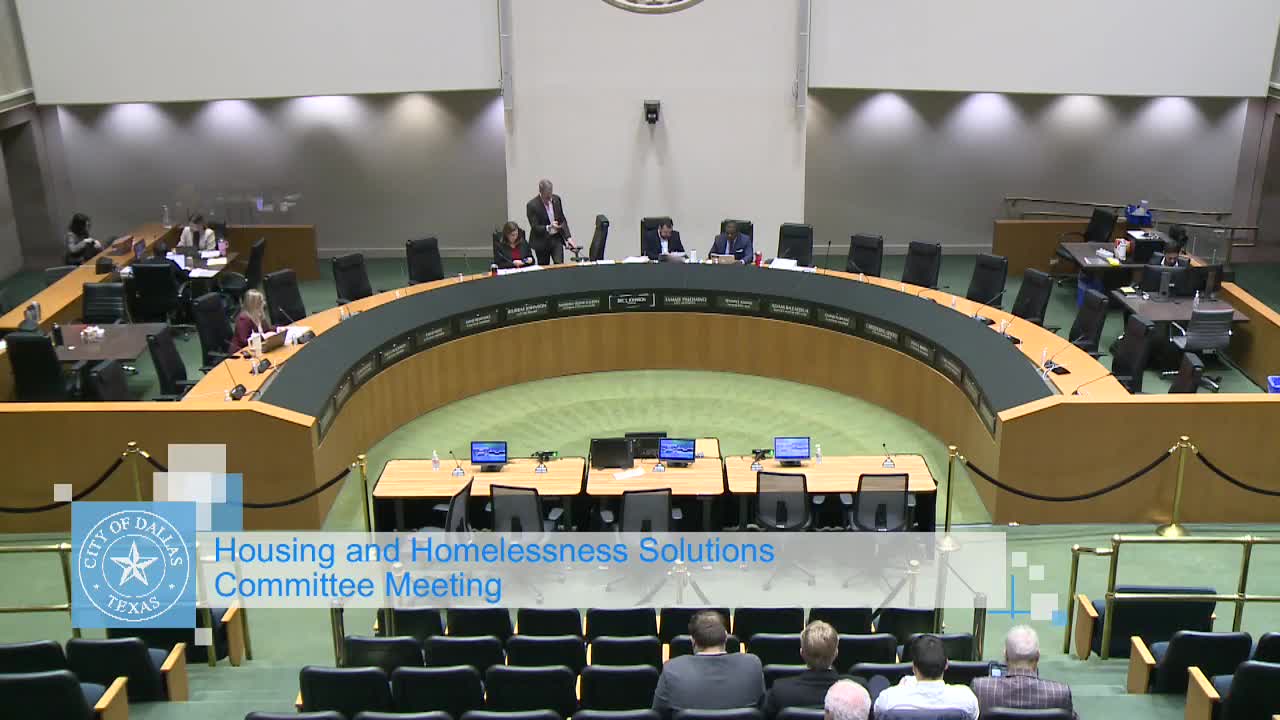City staff and Housing Forward seek ARPA support for $30M "Street to Home" push to halve unsheltered homelessness
Get AI-powered insights, summaries, and transcripts
Subscribe
Summary
Dallas officials briefed the Housing and Homelessness Solutions Committee on the "Street to Home" initiative — a $30 million mix of federal, local and private funding intended to reduce unsheltered homelessness by 50% — and requested a $5.6 million ARPA allocation to support 185 housing placements.
Christine Crosley, director of the Office of Homeless Solutions, and Sarah Khan, CEO of Housing Forward, briefed the Housing and Homelessness Solutions Committee on Jan. 28 on an expanded homelessness-response initiative called Street to Home.
The initiative builds on earlier city investments and a public–private program known as the Dallas Real Time Rapid Rehousing Initiative. Christine said the earlier effort began with an initial infusion of roughly $72 million that the presenters credited with enabling accelerated rehousing and other system improvements.
"This public private partnership with its unprecedented commitment of roughly $72,000,000 jump started our system into a no new fully aligned direction," Christine said.
The progress to date and the new goal
Sarah Khan described measurable progress: the city and partners have reduced unsheltered homelessness by about 24% since the earlier initiatives and are aiming for a 50% reduction through Street to Home. She said the city placed 27,100 people under the initial program goal and then exceeded rehousing goals in subsequent phases.
"We are setting our sights to get to a 50% reduction in unsheltered homelessness," Sarah Khan said. "There's two really important aspects of this initiative: resolving homelessness in public spaces with on-site integrated behavioral health care, and accelerating rehousing out of our existing shelter system."
Funding package and city request
Street to Home is a $30 million initiative that the presenters described as a mix of $10 million federal funding (reported as secured), $10 million local public funds and a private-sector $10 million fundraising goal. Christine and Sarah asked the committee to consider a specific city ARPA allocation of $5,600,000 as part of the local public portion.
City staff framed the $5.6 million ARPA request as a narrower city-level package that would accomplish housing for roughly 185 individuals, including rental assistance, deposits, supportive services and housing navigation. Staff characterized the local ARPA ask as part of the broader $30 million effort intended to buy time while longer-term sustainable revenue is identified.
Contracts and next steps
Christine said one contract using ARPA would come to city council on Feb. 12 and two additional HOME-ARPA contracts would follow in spring after further preparation. City staff said they also released an RFI for interim housing and would return in the spring with additional contract items tied to the initiative.
Committee questions and concerns
Council members and committee participants raised questions about the sustained funding model after the one-time infusion, capacity to manage medically complex individuals, whether the county would align funds and how to keep downtown areas closed to new camping following encampment closures. Sarah Khan said the initiative includes both a permanent supportive housing track (for people with ongoing behavioral health needs) and a rapid rehousing track (twelve to 24 months of rental assistance for people who do not need long-term supports).
"We have multidisciplinary health care teams that are able to support people," Sarah Khan said about the permanent-supportive-housing track, adding the teams can provide "in-home support" that follows tenants into the community.
No formal vote was taken at the committee; staff said ARPA contracts would be brought to council and that the county and private sector were being solicited for complementary funding.
Why it matters
City staff contend Street to Home is the next phase of a multi-year realignment that city leaders say has produced measurable reductions in unsheltered homelessness and unlocked additional federal resources. The City of Dallas and local providers presented the program as a strategy to reduce visible homelessness in public spaces, increase on-site behavioral health and accelerate rehousing out of shelters to maintain shelter capacity and reduce overflow onto the streets.
Ending
City staff requested committee support for the approach and said the first ARPA contract would come to council for consideration on Feb. 12 with additional HOME-ARPA items following in spring. They also said they would present system modeling later to estimate the annualized local funding needed after 2026.
